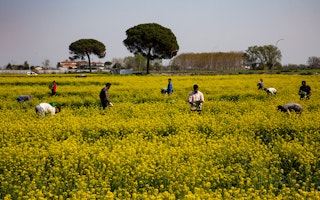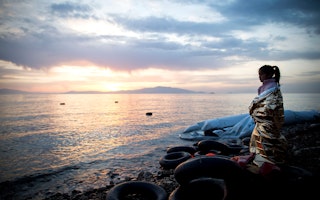EU Plan on Migration Will Only Give North Africans More Reason to Flee
By Srdjan Cvijic
As the EU Foreign Affairs Council discusses Egypt and Libya today, the focus is on how to slam the door shut on refugees and migrants trying to cross the Mediterranean. The bloc’s negotiations with Cairo and Tripoli aim to outsource migration control ahead of upcoming elections in the Netherlands, France, and Germany.
But plans to support regional security forces’ efforts to prevent people leaving North Africa are shortsighted. Bolstering authoritarian regimes will only lead to more human rights violations and more people determined to flee them.
The date of the meeting alone should give the EU pause for thought. It has now been a year since 28-year-old Cambridge researcher Giulio Regeni was abducted, tortured, and murdered in Egypt. President Abdel Fattah al-Sisi’s government has failed to arrest his killers and shown no interest in a full investigation.
Al-Sisi’s security forces are strongly implicated in Regeni’s death. The postgraduate had been researching the trade union movement, perceived as an opposition group by the government. Police are reported to have taken him into custody shortly before he died, and a forensics expert found he was tortured and questioned for a full week at intervals of 10 to 14 hours. The expert also found Regeni’s body had more than two dozen broken bones, including all his fingers and toes, stab wounds in the soles of his feet, cigarette burns, and a broken spine.
Regeni’s fate is only the tip of an Egyptian iceberg. Since al-Sisi came to power in a coup, authorities have imprisoned tens of thousands of Egyptians. They have tortured activists, frozen NGO assets, and imposed travel bans on critical voices.
If Egyptian officials are involved in the horrific murder of Regeni, only pressure from outside the country is likely to lead to justice. Yet with Donald Trump as U.S. president, we can expect no American intervention. The U.S. leader has already praised al-Sisi as a “fantastic guy” who “really took control of Egypt” after forces under al-Sisi’s command killed at least 817 protesters during the Rabaa massacre.
As a result, EU intervention is fast becoming the last hope for pro-democracy activists in Egypt and across the Middle East and North Africa. The EU’s current direction will end up dashing those hopes. Member states’ desperation for deals to stop migration at the point of origin only encourages despots in the region further. Efforts to stem the flow of migrants will be used as an excuse to clamp down harder still on civil society.
Al-Sisi’s regime is already counting on this. In November, the Egyptian parliament passed a draconian law that threatens to wipe out independent civil society in the country. The bill requires NGOs to seek permission from government for almost every activity they plan to carry out. The EU has yet to publicly speak out against it.
This silence risks emboldening other strongmen across the region, encouraged by the rise of authoritarian leaders in some European capitals and the United States. It’s not surprising that regimes across the region are making use of terror threats and radicalization to justify repression to Western partners. Turkey’s skillful manipulation of the Syrian refugee crisis to wrest concessions from the EU has not gone unnoticed by its neighbors, who are busy striking their own deals with Brussels.
In EU deals with the region, short-term economic interests and short-term stability are trumping the bloc’s democratic principles. This approach was effectively codified in the November 2015 review of the European Neighbourhood Policy, which replaced action plans that included a strong human rights component with “partnership priorities” to be agreed on with human rights–violating governments.
Member states are compounding the damage done by this approach by forcing the EU to use funds allocated for protecting and promoting human rights to pay for addressing the refugee crisis. Middle East and North African governments’ use of refugees as bargaining chips will only exacerbate this trend and render EU response to the closing space for civil society more difficult still.
It’s time the EU woke up. Decades of courting Gaddafi, Mubarak, and Ben Ali and the civil wars that followed should have taught the EU and United States a lesson. Collectively sacrificing short-term economic gain for principles can prevent long-term pain in the future. The worsening of relations between one member state and a dictator should not be an opportunity for another to sweep in and sign a new defense, oil, or gas contract—only to complain about the refugees that follow.
The EU should be speaking with one voice when it comes to its foreign and security policy. Now is the moment for it to put public pressure on al-Sisi to send the law back to parliament. A strong response to the murder of Giulio Regeni and al-Sisi’s crackdown on Egyptian civil society would make a good first stand.
Until November 2022, Srdjan Cvijic was a senior policy analyst with the Open Society Europe and Eurasia Program.


